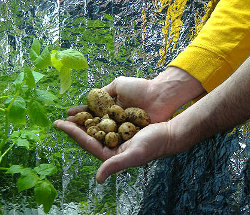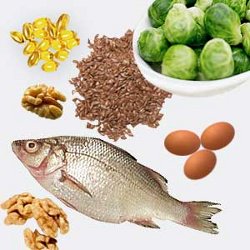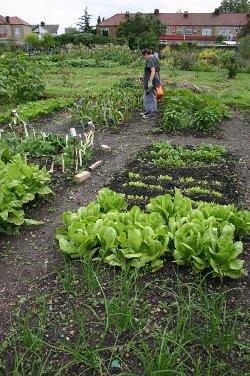Archive for the ‘Grow your own’ Tag
Why?
 Why do weed seeds manage to germinate during a drought where the seeds I sow require constant watering for just a few to decide its time to sprout?, Why do weeds grow faster, taller and better than everything else you plant in the garden? Why do frosts wait until late Spring, when when your fruit trees are in blossom, to make an appearance? Why do bugs only infest your best plants? Why don’t slugs and snails eat weeds but wait until the juicy shoots of you vegetables show themselves?
Why do weed seeds manage to germinate during a drought where the seeds I sow require constant watering for just a few to decide its time to sprout?, Why do weeds grow faster, taller and better than everything else you plant in the garden? Why do frosts wait until late Spring, when when your fruit trees are in blossom, to make an appearance? Why do bugs only infest your best plants? Why don’t slugs and snails eat weeds but wait until the juicy shoots of you vegetables show themselves?
Why does it only rain at weekends and the days you plan to do lots of gardening? Why does grass grow better in your flower borders and vegetable patch than on your lawn? Why do birds take a peck out of every ripe fruit instead of eating a whole one? Why does the best looking apple drop to the ground just after you have tested to see if its ripe? Why do the local cats dig holes right in the middle of a newly raked seed bed? Why do birds throw the bark chippings off the boarders onto the lawn? Why does bind weed appear out of nowhere? Why, if it is such an effort do we bother with gardening?
Why does home grown fruit taste so much sweeter than the stuff sold in shops? Why do vegetables gathered from the allotment look much more fresh and enticing than supermarket fare? Why are salad items so much crisper and tastier than the greengrocers offerings? Why? Because we are hunter gatherers at heart and providing food for the table is a natural instinct. Why then have so many people become detached from real food and how it is produced?
Its Good For You, Er, No Its Bad For You
 Recently published research has suggested that good fats in the form of polyunsaturates, or more correctly the linoleic acid they contain, may increase the incidents of inflammatory bowel disease. A similar finding was also discovered for omega 3 fatty acid found in oily fish. However, another research project claims that high levels of omega 3 fatty acid helps prevent age-related macular degeneration, a significant cause of blindness in the elderly; it is also thought to be of benefit to the heart.
Recently published research has suggested that good fats in the form of polyunsaturates, or more correctly the linoleic acid they contain, may increase the incidents of inflammatory bowel disease. A similar finding was also discovered for omega 3 fatty acid found in oily fish. However, another research project claims that high levels of omega 3 fatty acid helps prevent age-related macular degeneration, a significant cause of blindness in the elderly; it is also thought to be of benefit to the heart.
These contradictions are becoming increasingly common as scientists delve into the minutiae of the human body and nutrition. All they serve to prove is the body is an incredibly complex organism and the best life style choice is moderation and variety in all things edible; never was the term ‘balanced diet’ more appropriate. Unfortunately many people have become detached from the idea of a balanced diet, they have become addicted to high fat, high salt foods, ready made meals and ready prepared foods.
These items go under the very inappropriate banner of convenience foods, an aid to the fast pace of modern life. The truth is they cost more, are no quicker to prepare and contain a whole range of chemicals to compensate for the poor quality ingredients. Fortunately, one way people are getting back in touch with real food is by growing their own, either on a vegetable patch or on an allotment. The satisfaction of serving a meal where all the fruit and vegetables have been grown yourself is immeasurable. The taste is pretty good too.
Its Only Good If Its Got A Celebrity
 In today’s Sunday Mail colour supplement is an article about Sky News presenter Kay Burley’s exploits in growing her own food. The pictures that accompany the article show Kay in three different outfits each carefully posed to show her at her best and not the real subject of the article the fruit, vegetables and chickens she is raising for the dinner table.
In today’s Sunday Mail colour supplement is an article about Sky News presenter Kay Burley’s exploits in growing her own food. The pictures that accompany the article show Kay in three different outfits each carefully posed to show her at her best and not the real subject of the article the fruit, vegetables and chickens she is raising for the dinner table.
An important role of the media is to keep the public informed; keeping an allotment and growing your own food is has become very popular and is worthy of objective and informative coverage. Unfortunately the article is typical of the way the media feel that unless there is a celebrity at the centre of the action the public will be uninterested in the subject matter. What happens, of course, is the subject is only used as a vehicle to promote a celebrity who ultimately becomes the focus.
Allotments are not just about growing your own food, they also increase community cohesion and provide opportunities for families to work together, teach children about food, nutrition and the environment. There are many very interesting stories stemming from the resurgence in interest in allotments, its a pity the Sunday Mail did not give the story the importance it deserves.
This Blessed Plot
Having lifted the last row of potatoes and dug up two of the last parsnips and four of the last nine leeks the allotment is looking bare. The strawberry plants are just starting to throw up new leaves and the rhubarb has small bright red shoots just showing above the soil. The rest of the plot is covered with old carpet to suppress the weeds, act as a mulch to keep the soil moist ready for sowing and planting and provide protection for the resident mole. For a few months the plot will be unproductive until the asparagus starts to shoot in mid to late April.
It’s easy to understand why there is a high demand for allotments. If you are careful they can save you money, the fruit and vegetables taste much better, and it helps to keep you fit. It can be frustrating to see you cabbages eaten by caterpillars, broad beans eaten by partridges and peas eaten by mice. But when you find a grass snake basking on the top of the compost bin and friends begging a few spears of freshly cut asparagus it makes more than worth while.
If you plan carefully and choose easy to grow produce it does not have to be hard work. In fact what work there is to do is tempered by the many conversations with fellow alottmenteers and just sitting in the quiet of the plot and absorbing the peace all around.
 Leave a comment
Leave a comment